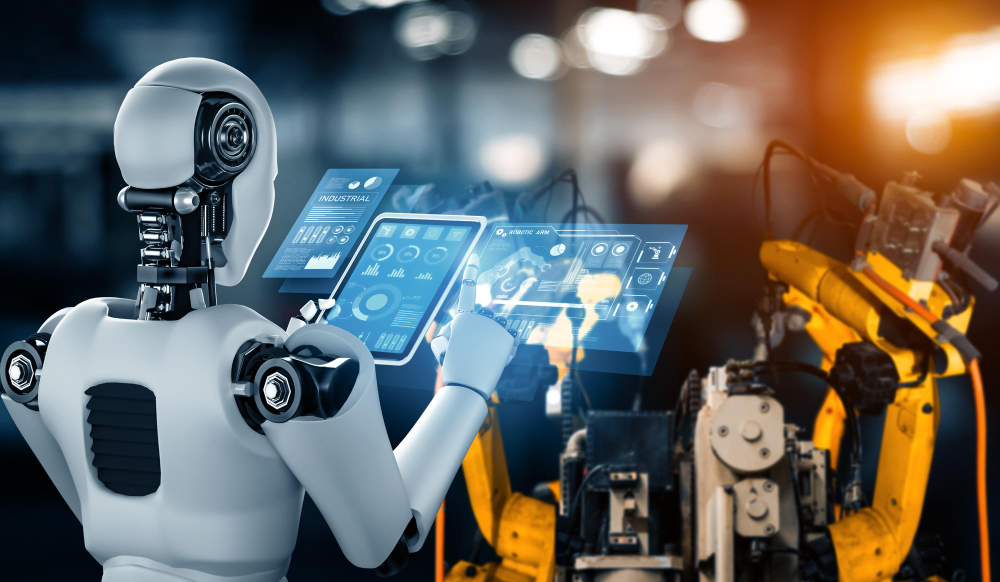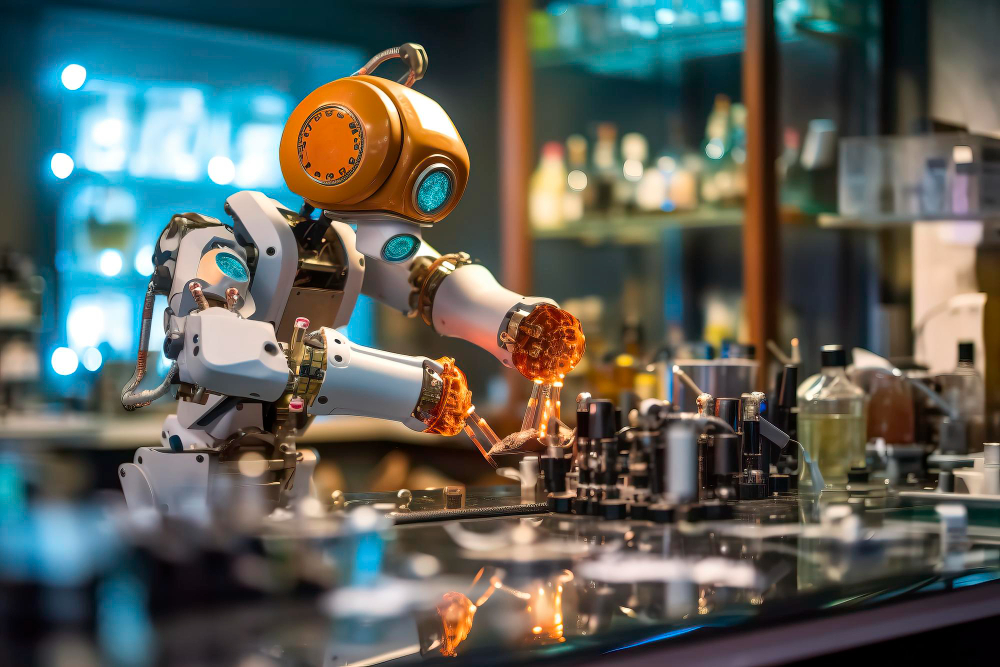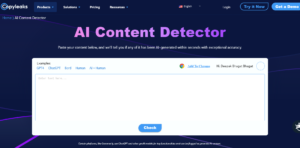How Intelligent Automation is Redefining Industries with AI and Robotic Process Automation
- 1 How Intelligent Automation is Redefining Industries with AI and Robotic Process Automation
- 1.1 Enhancing Communication with Natural Language Generation in Intelligent Automation
- 1.2 Leveraging Expertise: The Importance of Hiring App Developers for Intelligent Automation
- 2 Streamlining Innovation: The Role of Machine Learning Operations in Intelligent Automation
- 2.1 Empowering Smarter Decision-Making with Intelligent Automation
- 2.2 What is Intelligent Automation?
- 2.3 Transforming Industries with Intelligent Automation
- 2.4 Benefits of Intelligent Automation
- 2.5 Challenges of Implementing Intelligent Automation
- 2.6 The Future of Intelligent Automation
- 3 Conclusion
In the digital age, businesses across various industries continually seek efficiency improvements and cost reductions. Enter intelligent automation (IA)—the combination of artificial intelligence (AI) and robotic process automation (RPA), which redefines how industries operate by automating complex processes that once required human intervention. This powerful synergy is streamlining operations, enhancing productivity, and driving innovation. This blog explores how intelligent automation transforms sectors from finance to manufacturing and what this means for the industry’s future.
How Intelligent Automation is Redefining Industries with AI and Robotic Process Automation

Enhancing Communication with Natural Language Generation in Intelligent Automation
Natural language generation (NLG) plays a crucial role in the evolution of intelligent automation by enhancing the way systems communicate with humans. As a subset of AI, NLG allows automated systems to generate human-like text from data, making it an invaluable tool in various industries. For instance, in customer service, NLG can automate the creation of personalized responses to customer inquiries, significantly speeding up response times while maintaining a high level of personalization and accuracy.
In finance, NLG generates insightful, detailed financial reports and executive summaries, transforming raw data into easy-to-understand narratives. This capability improves efficiency and makes the insights derived from AI more accessible and actionable for decision-makers, proving that NLG is a key enhancer in the intelligent automation landscape.
Leveraging Expertise: The Importance of Hiring App Developers for Intelligent Automation
Companies are increasingly looking to hire app developers to capitalize on the benefits of intelligent automation fully. These developers are crucial for integrating AI and RPA capabilities into mobile and web applications, enhancing operational efficiency and user engagement. With skills in both programming and the latest AI technologies, these developers can create applications that automate complex processes, provide real-time analytics, and facilitate seamless user interactions. For example, in the retail industry, app developers can build intelligent systems that automate inventory management and deliver personalized shopping experiences based on user behaviour and preferences. Hiring skilled app developers accelerates the adoption of intelligent automation and ensures that businesses remain competitive and innovative in an ever-evolving digital landscape.
Streamlining Innovation: The Role of Machine Learning Operations in Intelligent Automation
Machine Learning Operations (MLOps) is critical in maximizing the effectiveness of intelligent automation across various industries. As the backbone that ensures the seamless performance and scalability of AI models, MLOps facilitates the continuous integration and deployment of these models within automated systems. This structured approach enhances the operational efficiency of machine learning projects and maintains their reliability and accuracy over time. For instance, in manufacturing, MLOps can streamline the process of deploying AI algorithms that predict maintenance needs, thereby reducing downtime and increasing productivity.
By adopting MLOps, companies ensure that their intelligent automation solutions are innovative, sustainable, and adaptable to changing market conditions and data environments.
Empowering Smarter Decision-Making with Intelligent Automation
Intelligent automation significantly enhances decision-making processes across various industries by providing data-driven insights and automated analysis capabilities. In sectors such as finance and healthcare, intelligent automation tools use AI to analyze large volumes of data quickly and accurately, offering predictions and recommendations far beyond human capabilities. For instance, smart automation systems in finance can evaluate market trends and consumer behaviour to suggest optimal investment strategies. Similarly, these systems analyze patient data in healthcare to recommend personalized treatment plans.
This level of automation accelerates decision-making processes and increases their accuracy, ensuring that businesses and healthcare providers can make more informed, effective decisions. By integrating intelligent automation, organizations are improving operational efficiency and equipping themselves to respond more adeptly to market changes and patient needs, thereby enhancing overall outcomes. Additionally, this automation fosters a proactive approach, allowing companies to anticipate future challenges and opportunities rather than simply reacting to them.
What is Intelligent Automation?
Intelligent automation represents a blend of AI technologies with RPA to create systems that can perform routine tasks and make judgments that typically require human intelligence. While RPA is used to automate repetitive tasks, AI can handle tasks that involve decision-making and problem-solving based on data analysis, learning, and understanding.
Transforming Industries with Intelligent Automation
- Healthcare: Intelligent automation is revolutionizing patient care and administrative operations in the healthcare industry. AI-driven systems can predict patient diagnoses faster and more accurately by analyzing data patterns humans might overlook. Furthermore, RPA handles patient scheduling, claims processing, and medical record management, freeing healthcare professionals to focus more on patient care.
- Finance: The financial sector benefits from IA by automating high-volume, repetitive tasks such as data reconciliation and processing transactions. AI enhances capabilities by providing predictive analytics for investment and detecting fraudulent activities through anomaly detection techniques. This not only speeds up processes but also increases accuracy and security.
- Manufacturing: Intelligent automation streamlines production lines and reduces downtime by predicting maintenance needs. AI algorithms optimize manufacturing processes by adjusting real-time conditions based on machine learning models, thus improving quality and yield.
- Retail: Retailers use IA to personalize shopping experiences and optimize inventory management. AI systems analyze customer data to tailor product recommendations, while RPA automates stock level adjustments and ordering processes, significantly improving supply chain efficiency.
Benefits of Intelligent Automation
- Increased Efficiency: Automating routine tasks accelerates processes and eliminates bottlenecks, leading to greater operational efficiency.
- Cost Reduction: By reducing the need for manual intervention, companies can lower labour costs and minimize human error, decreasing waste and operational costs.
- Enhanced Customer Experience: Intelligent automation allows real-time customer service interactions and personalized experiences, enhancing customer satisfaction and loyalty.
- Scalability: AI and RPA systems can quickly scale up or down based on business requirements, providing flexibility that traditional human workforces cannot match.
Challenges of Implementing Intelligent Automation
Despite its benefits, the adoption of intelligent automation comes with its set of challenges:
- Integration Complexity: Integrating IA into existing systems can be complex and resource-intensive, requiring significant upfront investment.
- Skill Gaps: There is a growing need for skilled professionals who can design, implement, and manage IA systems. Organizations often face challenges acquiring the right talent and providing the necessary training.
- Security and Privacy Concerns: Handling vast amounts of data raises security and privacy concerns. Ensuring compliance with regulations and securing systems against breaches is critical.
The Future of Intelligent Automation
As technology advances, intelligent automation’s scope will expand further. Future developments may include more sophisticated AI capabilities, such as more profound learning algorithms to make decisions in more complex scenarios. Moreover, as businesses recognize the value of IA, its adoption is expected to increase, leading to more innovative applications and industry transformations.
Conclusion
Intelligent automation is a tool for enhancing efficiency and a transformative force across industries. By combining the tireless capacity of RPA with the cognitive power of AI, businesses are not only optimizing their operations but are also creating new opportunities for growth and innovation. As we look towards the future, embracing intelligent automation will be essential for businesses aiming to stay competitive in an increasingly digital world.

















